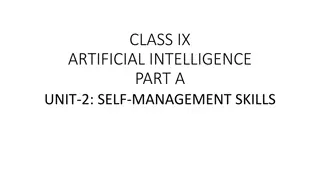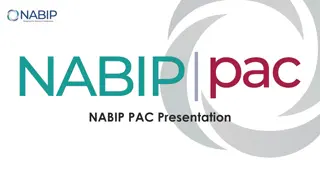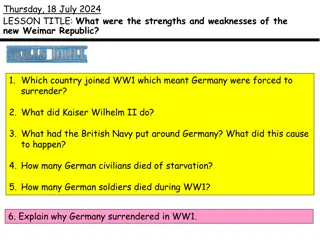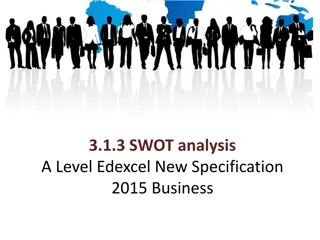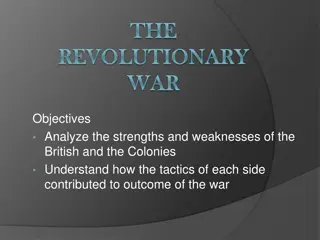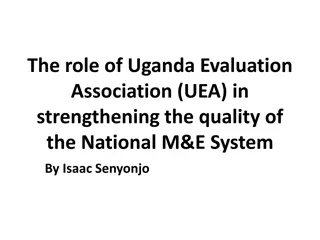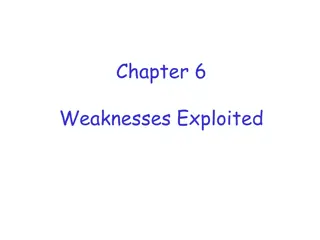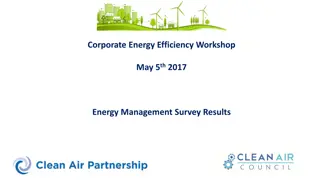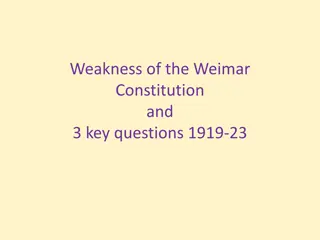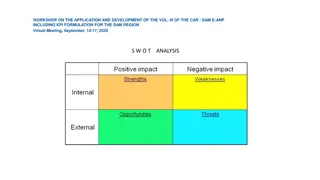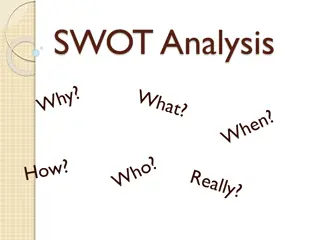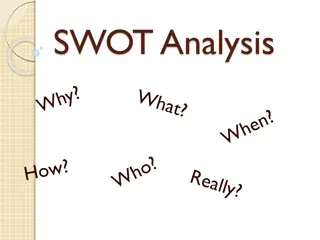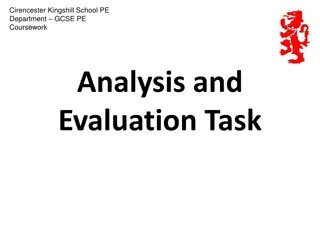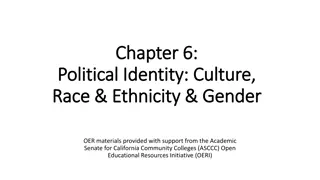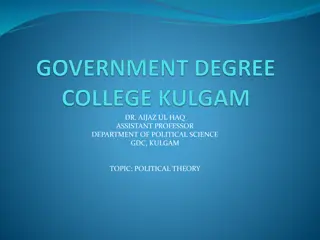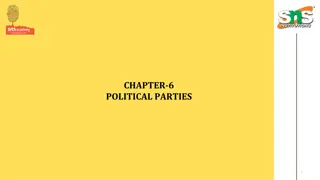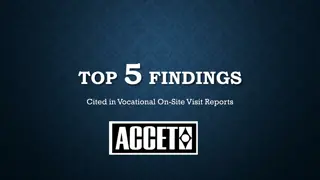TEAM SWOT ANALYSIS
This comprehensive presentation template guides individuals or small groups through conducting a SWOT analysis to identify strengths, weaknesses, opportunities, and threats for a business. It includes questions to assess strengths, weaknesses, opportunities, and threats, a discussion section to dete
1 views • 8 slides
Enhancing Self-Management Skills for Personal Growth
Self-management skills are essential for regulating emotions, thoughts, and behaviors effectively. Understanding yourself, setting goals, and developing positive habits contribute to self-improvement. Positive results of self-management include proactivity, goal setting, and self-reinforcement. Stre
1 views • 9 slides
Understanding NABIP PAC: Political Action Committee Overview
Federal law prohibits direct financial contributions to federal candidates, hence organizations like NABIP establish Political Action Committees (PAC) to advocate for political priorities. Learn about NABIP PAC, its accounts, eligibility criteria, contribution rules, and how funds are utilized. Disc
1 views • 14 slides
Contrasting Concepts in Political Science: Normative vs Descriptive Approaches
Normative and descriptive concepts in Political Science explore contrasting viewpoints on how things should be versus how they actually are. While normative claims focus on value judgments, descriptive claims deal with facts. These concepts complement each other by providing both theoretical and pra
0 views • 10 slides
The Strengths and Weaknesses of the Weimar Republic
The Weimar Republic faced a turbulent period with strengths like introducing proportional representation but also weaknesses such as political instability and economic struggles. Kaiser Wilhelm II's actions, the impact of WW1, and the challenges faced by the new government are discussed in the conte
0 views • 8 slides
Interdisciplinary Approach in Political Science and Its Relation with History
The need for an interdisciplinary approach in political science emerged in the 20th century to study political issues from various social science perspectives. This approach emphasizes the interrelation between political science and other disciplines like history. History provides the foundation for
0 views • 23 slides
Institutionalism and Methodological Issues in Political Science
Institutionalism is a foundational concept in political science, emphasizing the study of governing institutions and their role in shaping political behavior. It explores inductive and deductive approaches to research, highlighting the significance of empirical evidence and theoretical assumptions.
0 views • 19 slides
Understanding Gramsci's Political Theory and its Relevance Today
Gramsci's political theory, focusing on concepts such as hegemony, historical bloc, and the role of intellectuals, offers valuable insights into contemporary political challenges. Explored through the lenses of Prof. Ken Spours and Stuart Hall's analytical tradition, this analysis sheds light on Con
0 views • 13 slides
Evolution of Citizenship in Liberal Democracy
Citizenship within liberal democracy entails equal rights, duties, liberties, and constraints for individuals within a political community. The entrenchment of civil and political rights has shaped the struggle for membership and participation in political communities. Civil rights, essential for in
1 views • 11 slides
Understanding SWOT Analysis in Business
This guide covers SWOT analysis in business, focusing on internal strengths and weaknesses, as well as external opportunities and threats. It includes detailed explanations, lesson objectives, and practical applications of SWOT analysis for interpreting business considerations. Learn how to identify
2 views • 15 slides
Strengths and Weaknesses in the Revolutionary War
The Revolutionary War between the British and Colonies showcased distinct strengths and weaknesses on both sides. The British struggled with unconventional warfare tactics and failed to win over the hearts of the colonists, while the Patriots benefited from strong leadership, support systems, and ci
0 views • 9 slides
Strengthening Uganda's National M&E System through UEA Evaluation Strategies
Uganda Evaluation Association (UEA) plays a key role in enhancing the quality of the National Monitoring and Evaluation (M&E) System. The SWOT analysis reveals UEA's strengths, weaknesses, opportunities, and threats, while also evaluating the National M&E System in Uganda. The UEA's strategi
0 views • 33 slides
Understanding Political Theory through a Contextual Approach
Exploring G.H. Sabine's perspective on political theory through a contextual approach, emphasizing the importance of historical context and societal influences. Sabine argues that while political theory evolves with its contemporary politics, it should be analyzed within its specific time and social
0 views • 9 slides
Enhancing Student Writing: Effective Feedback Strategies
Enhance student writing through effective feedback strategies sponsored by the Writing Across the Curriculum Program at San Jose State University. The feedback process is viewed as an opportunity to teach, emphasizing strengths, weaknesses, and improvement areas for students. Designing clear instruc
0 views • 60 slides
Unveiling Positive Psychology: Shifting Focus from Weakness to Strength
Delve into the evolution and principles of positive psychology, which emerged as a reaction to traditional approaches focusing on weaknesses. Learn about its roots in humanistic psychology, and the shift towards a more holistic and strengths-based perspective. Explore how positive psychology advocat
7 views • 19 slides
Understanding Software Weaknesses and Exploits
Discover the vulnerabilities present in software such as buffer overflows and format string vulnerabilities, and how these weaknesses can be exploited to cause security issues. Learn about the technical aspects of weaknesses, stack frames, memory organization, and the potential consequences of stack
0 views • 57 slides
Understanding Political Beliefs and Behaviors: A Comprehensive Overview
Explore the formation, evolution, and transmission of political beliefs, as well as the impact of differing beliefs and behaviors on the political process. Delve into platform issues, political affiliations, and their influences to gain a deeper understanding of the political landscape.
1 views • 53 slides
Understanding Nationalism in Political Science
Nationalism, a complex concept, defines the nation as the fundamental unit of political rule. It encompasses a mix of objective and subjective factors, including cultural, ethnic, and political traits. The definition of a nation is subjective, based on how its members perceive themselves as a distin
0 views • 27 slides
Energy Management Software Comparison: Strengths and Weaknesses
This analysis compares the strengths and weaknesses of various Energy Management Software (EMS) options like EnergyCAP, Ameresco, EEMS, Lucid, Entech Gold, FacilityDude, UtilityTrac, and NUS Direct. Strengths include cost avoidance, real-time data monitoring, bill management, and more. However, weak
0 views • 8 slides
Understanding Political Science: A Comprehensive Overview
The study of political science delves into various aspects, from the pursuit of the good society to the exercise of power and the allocation of resources. It encompasses specialized fields such as American politics, international relations, comparative politics, public policy, and political philosop
0 views • 5 slides
The European Parliament's Role in EU-Building: Analysis and Perspectives
The European Parliament plays a crucial role in the EU decision-making process through co-legislation procedures and the election of the Commission President. Despite some weaknesses, it is gaining political salience and influence, serving as a key accountability body for EU leaders. The Parliament
0 views • 10 slides
Rise of Mussolini in Italy and Weaknesses of the Liberal Monarchy
The historical timeline of Italy before 1919 led to Mussolini's rise to power through various events such as his involvement with the Italian Socialist Party and the formation of the Fascio di Combattimento. Italy's Liberal Monarchy faced weaknesses, including political divisions between progressive
0 views • 35 slides
Weaknesses of the Weimar Constitution and Key Questions 1919-23
The Weimar Constitution had strengths such as democratic PR but weaknesses like Article 48 leading to dictatorship vulnerability. Additional weaknesses included a right-wing bias and a Republic dominated by anti-Republican personnel. The period also saw a revolution in 1918 due to military defeat. T
0 views • 12 slides
Political Development Theory and Practice: An Overview
Political development refers to the evolution of institutions forming the political power system of a society. Initially popular in the 60s-70s to describe political change, it later fell out of favor for being Euro-centric but has since regained significance. The concept encompasses aspects like po
0 views • 13 slides
Political Party Funding Act 2018 Overview
The Political Party Funding Act of 2018 in South Africa aims to enhance multi-party democracy by regulating the funding and donations to political parties. It establishes the Multi-Party Democracy Fund funded by private sources, alongside the existing Represented Political Party Fund. The Act prohib
0 views • 17 slides
Understanding Political Party Funding Act of 2018
The Political Party Funding Act of 2018 regulates the funding of political parties in South Africa, ensuring equitable and proportional funding for parties participating in national and provincial legislatures. The Act defines various terms such as donations, foreign persons, and political parties,
0 views • 42 slides
Common Weaknesses in Schools Offering Intensive English Programs
Top five weaknesses identified in schools offering Intensive English Programs based on past accreditation cycles include issues with financial procedures, student progress policies, and attendance policies. Each weakness is accompanied by recommendations on how to respond and ensure compliance. Trai
0 views • 13 slides
Evolution of Political Ideas and Influences on American Founding
In the history of politics, major ideas like laws of nature, unalienable rights, divine right of kings, social contract theory, and rights of resistance have influenced the American founding. Various traditions such as Judeo-Christian, English common law, Enlightenment, and republicanism played a si
0 views • 68 slides
Workshop on Application & Development of VOL. III of CAR/SAM E-ANP with SWOT Analysis
Virtual workshop discussing strengths, weaknesses, opportunities, and threats related to the development of the VOL. III of CAR/SAM E-ANP in the SAM region. Strengths include active regional plans and aligned frameworks, while weaknesses involve lack of regional structure and technology backup issue
0 views • 12 slides
Comprehensive Guide to SWOT Analysis in Business
SWOT analysis is a strategic planning tool used to evaluate the Strengths, Weaknesses, Opportunities, and Threats of an organization or a business. It helps in identifying key issues, building on strengths, minimizing weaknesses, seizing opportunities, and counteracting threats. By focusing on turni
0 views • 18 slides
Understanding SWOT Analysis for Business Success
SWOT Analysis is a vital tool for auditing an organization and its environment, helping to identify internal strengths and weaknesses, as well as external opportunities and threats. By leveraging SWOT, businesses can capitalize on their strengths, address weaknesses, seize opportunities, and mitigat
0 views • 20 slides
Enhancing Performance Through GCSE PE Coursework Evaluation
In the GCSE PE coursework analysis and evaluation task at Cirencester Kingshill School, students are required to assess mark allocation, identify strengths and weaknesses, devise sessions to combat weaknesses, and create evaluation plans focusing on training methods like circuit training. The emphas
0 views • 26 slides
Explore the Fascinating World of Political Science
The Department of Political Science offers a range of courses, delving into topics such as political theory, international relations, and governance. Understand the distinction between politicians and political scientists, and explore branches of political science like public administration and huma
0 views • 16 slides
Understanding Political Identity: Culture, Race & Gender in Society
Explore the intricate aspects of political identity, culture, race, ethnicity, and gender in society. Discover how individuals shape their identities and the impact of political mobilization on society. Uncover the significance of political socialization and the role of societal institutions in shap
0 views • 20 slides
Evolution of Political Protests in Modern Russia: A Historical Overview
This article provides an in-depth analysis of the evolution of political protests in modern Russia from 1990 to present. It discusses the attitude of Russian journalists towards protests, basic concepts of political protest in modern political science, myths surrounding protests in Russia, and the f
0 views • 24 slides
Impact of Political Stability on Equity Trading Costs of Cross-Listed Firms
The research explores the relationship between political stability and equity trading costs of cross-listed firms, highlighting the impact of political institutions, liquidity, and investor protection. It delves into the importance of factors like quality of political institutions, transparency, and
0 views • 24 slides
Interdisciplinary Relationships in Political Science
Political science and history share a symbiotic relationship, with history providing the foundation for political analysis while political science influences historical events. The contribution of economics to political science is evident in how economic conditions shape political ideologies and pol
0 views • 12 slides
Understanding Political Theory: Definitions, Differences, and Significance
Political theory encompasses systematic explanations of political phenomena, distinct from political thought which involves ideas and opinions of philosophers. It constitutes both political science and philosophy, addressing both empirical and evaluative aspects. The significance lies in finding sol
0 views • 7 slides
Remedial Measures Implemented by Indian Political Party
Explore the impactful remedial measures taken by a prominent political party in India through a collage presentation. Delve into the functions of political parties, understanding partisanship, the necessity of political parties, and more. Gain insights into the significance and role of political par
0 views • 23 slides
Strategies for Responding to Weaknesses in Vocational On-Site Visit Reports
Responding to weaknesses identified in vocational on-site visit reports is crucial for institutions to meet the ACCET standard and improve processes over time. Strategies include thorough reading, careful planning of responses, and robust documentation. Specific areas such as completion and placemen
0 views • 14 slides

